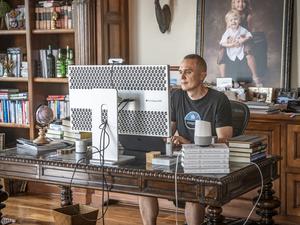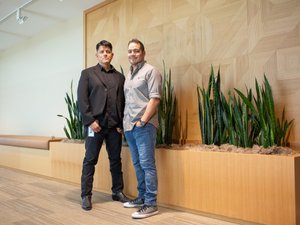
Time is money. And it adds up fast when you have big construction crews and subcontractors waiting around while other workers locate equipment and supplies to stage the next phase of a building project. But radio frequency location and the Internet of Things is quickly changing the game, from tracking material shipments to finding the keys for the bulldozer.
And that's the niche Primal Sensors, a startup from Dallas that recently relocated to the Capital Factory in Austin, is focused on.
Primal Sensors' 3-person team has been working with RFID and beacon technology for a couple years. And, heading into 2016, the startup is raising a $500,000 investment round and planning to deploy and test their sensor systems and platform with a few construction companies. It's also exploring integration with other construction tech companies, such as PlanGrid and Procore.
King said most of the innovations in construction have been focused on the pre-planning and designing sides of the business. Now, there's more focus on operations -- saving time, money and lives.
"The construction industry itself has been adopting new technology over the last 10 years," King said. "It's kind of late to the game when it comes to developing more efficient processes. It's people-driven. It's a human experience. But it's not one that so gung-ho about replacing people that it's adopting a ton of technology. But it's going there."
Primal Sensors uses small, rugged sensors that you attach to equipment -- be it a jackhammer, a bulldozer or even an employee -- and at least three beacons placed throughout the construction site track them and provide data to the software platform. It's all battery-powered and lasts days without recharging.
Primal Sensors is in discussions with several major construction companies, but it hasn't yet deployed for real-world testing. The company sells its service to companies on a subscription basis. The company provides the hardware and software, and companies can move them from one site to another.
Shifting Focus from Ski Resorts and Events to Construction Sites
The idea for Primal Sensors was formed after co-founder Jerry King spent two hours shivering at the finish line of an obstacle course race waiting on his friends. If only he had known they were so far back on the course, he could have changed clothes and got a cup of coffee to warm up. Instead, he waited and waited.
There should be a way to see where your friends and teammates are at on these course, King thought. And, soon, he was looking for a co-founder who could dig into the technology necessary to make it happen. Andrew Davis, an experienced tech product manager and engineer fit the bill and joined King in founding Primal Sensors. And Davis brought Carl Roke on to design the software.
Their story, like many other startups, shows the nuance involved in taking a cutting-edge idea from one market, events like the obstacle course, to another, such as ski resorts, only to find that the real niche may be in an entirely different and potentially more lucrative industry.
King got the entrepreneurial bug during grad school. And when he moved to Shanghai to build his resume, he started working with Dragon Events, which organized pub crawls and private events. He moved on and, more recently, worked in finance for DirectTV and Balfour Beatty Construction.
And, after that shivering experience waiting on his friends at the obstacle course finish line, King got started building a company with the idea of giving consumers a way to keep track of their friends at running events, water parks, ski resorts and other events where it's easy to get separated from your crew. He and Davis entered The Collide Village Accelerator Program in Dallas, landed some initial funding and got three months of tutoring.
King said they generated a lot of interest and traction. But they also found how difficult it is to gain traction with big resorts and parks, which often have limited, seasonal buying cycles in the off-season.
"It was very, very tough to really implement and jump into that market without having things solidly ready to go," King said. "So we missed a couple areas in the market where we could have jumped into it and launched. But it just wasn't ready."
But, along the way, King met representatives from a construction company at a hackathon in Dallas where major companies were checking out the latest tech and talent. The construction company representative asked about whether the sensors could be applied to construction equipment and personnel.
Pivoting to construction didn't require any major changes to Primal Sensors' product, but it required a new marketing message and sales strategy. Primal's initial customer-base is in Dallas, but Austin's construction boom, supportive startup network and Capital Factory programs drew the company to Austin.
"But, we're wherever we need to be," King said.
On a construction site, Primal Sensors' equipment would most likely be used to coordinate general contractors that manage the entire project and numerous subcontractors that come on to major sites for a few months to complete their phase of the work. The general contractor can take goods that come onto the site, tag them with a sensor and see where things are on a laptop screen.
"What they're getting is the transparency to see anything that's on site," King said. "Where are the pallets, where are the tools. They'll know where things are and be able to prepare for what's happen next week and be able to be ready to go without wasting time."
Going forward, King said he hopes to solidify a handful of relationships with construction companies and explore the military market, which also has huge needs for tracking equipment. "Disaster relief, military use, drill weekends, Air National Guard... those are large operations that need some help when it comes to the tracking of its stuff, people and other assets," King said.







